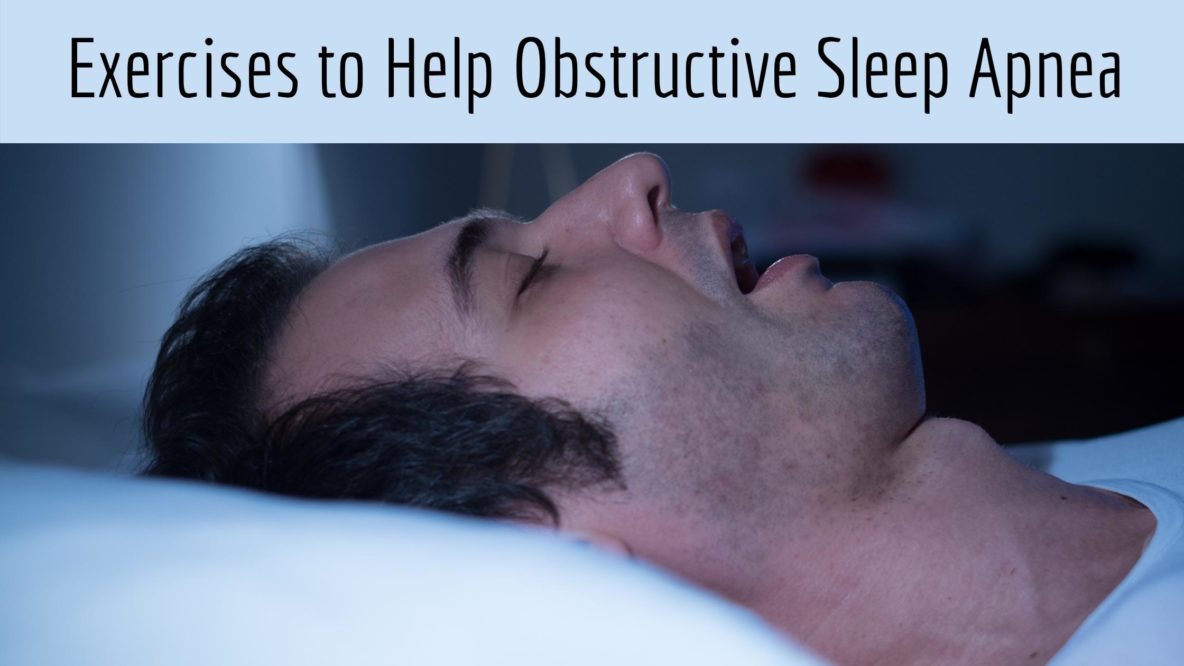Exercises to Help Obstructive Sleep Apnea

- A Promising Paradigm Shift: New Research Challenges the CPAP-First Approach to OSA Treatment - September 5, 2023
- Understanding Sleep Meditation Techniques - July 30, 2021
- How Online Learning Has Affected Sleep for Students - July 13, 2021
Do you snore during sleep? Snoring can be a sign of a sleep disorder such as obstructive sleep apnea. This disorder disrupts sleep and makes it hard for you to get the rest you need. Try these exercises to reduce snoring and help obstructive sleep apnea.
How do Exercises Help?
It might seem strange to suggest that exercises can help you stop snoring. But it’s true. If you have mild snoring or sleep apnea, some throat and mouth exercises can help. That’s because sleep apnea, and snoring, can be caused by the muscles in your throat. When these muscles get too relaxed at night they vibrate while you breathe, causing snoring. The muscles can even relax so much they block your airway altogether. This causes sleep apnea, and you’ll have to wake throughout the night to restart your breathing.
Do some exercises during the day to strengthen and tone the muscles in your tongue, throat, and mouth. This can prevent snoring at night and reduce the symptoms of obstructive sleep apnea.
Stick With It
Like any exercise, you’ll need to stick with it to see results. You can’t go to the gym for a week and expect to be as strong as a bodybuilder. If you snore or have mild obstructive sleep apnea, try these exercises for 10 minutes a day for 3 months to get the full benefit and reduce snoring. You can do the exercises all at once, but it’s easier to do the exercises 2 or 3 times per day. And don’t worry, you don’t need to go to the gym to do these exercises, and you don’t need any special equipment.
Tongue Exercises
Start with some tongue exercises. Sleep apnea and snoring can be caused by poor tongue positioning that blocks your airway while you’re sleeping.
- Tongue Stretch: you can tone the muscles in your tongue by stretching your tongue out as far as you can. Try touching your chin with your tongue while you look up. Hold for 10 seconds and repeat 5 times.
- Tongue Slide: Put your tongue on the roof of your mouth right behind your front teeth. Then slowly slide your tongue back along the roof or your mouth. Repeat this exercise 5 times.
- Tongue Push Up: Push your entire tongue up against the roof of your mouth. Hold for 10 seconds and repeat this exercise 5 times.
- Tongue Push Down: With the tip of your tongue touching the front of your lower teeth push your entire tongue flat against the bottom of your mouth. Hold it for 10 seconds and repeat 5 times.
Facial Exercises
After working out your tongue, move on to face exercises. By toning the muscles in your mouth and face you can prevent loose muscles in the night and prevent snoring.
- Open and Close: start by closing your mouth tightly and pursing your lips. Then open your mouth and let the muscles around your jaw and mouth relax completely. Repeat 5 to 10 times.
- Cheek Hook: Using a finger hook your cheek and lightly stretch it outward. At the same time, use your facial and mouth muscles to pull your cheek back inward. Repeat 5 to 10 times on each side. This exercise will help strengthen the facial muscles and keep your mouth closed while sleeping.
Breathing Exercises
This last exercise will help you breathe more consistently through your nose. Doing breathing exercises during the day can help you breathe through your nose at night.
Alternate Nostril Breathing: With your mouth closed, inhale deeply through your nose. With a finger, block one nostril. Breathe out through the open nostril, and then breathe in. Block the other nostril, then breathe out and in through the open nostril. Repeat 10 or more times.
This breathing exercise can show you if you breathe more through one nostril, or if one nostril is more congested. You can choose to breathe through the congested nostril to open your airways before bed.
Other Exercises
To strengthen the throat muscles, try singing or pronouncing vowel sounds slowly. All these exercises can strengthen your muscles, but they can’t replace expert advice. Visit Sound Sleep Medical to find out more about obstructive sleep apnea and explore your treatment options.
